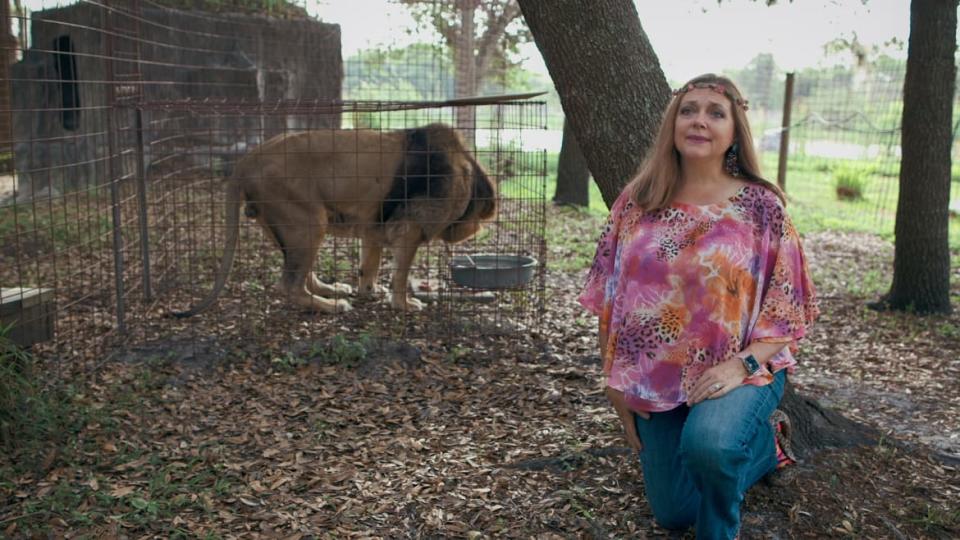‘Tiger King’s’ Carole Baskin Denies Murdering Second Husband, Mincing Him and Feeding Him to Big Cats

Carole Baskin has hit back at suggestions in the Netflix show Tiger King that she murdered her second husband, Don Lewis, 23 years ago and fed him to her tigers.
Her third husband, Howard Baskin, with whom she runs a Florida tiger sanctuary, has also challenged Kim Kardashian to come and visit their rescue center after the reality-TV star sent out a tweet referencing the possibility that Carole murdered Lewis.
The Baskins posted a lengthy statement and an emotional video on their website refuting the suggestions, made in Episode 3 by the documentary’s antihero, Joe Exotic, that Carole murdered Lewis and fed his body to their big cats.
Exotic went as far as to make a video showing a woman, who bore a resemblance to his archenemy Baskin, tossing meat to a big cat.
As viewer of the series will know, Exotic is in prison, serving 22 years for plotting to murder Baskin.
On Monday, Hillsborough County Sheriff Chad Chronister tweeted a message seeking new information on the disappearance of Lewis in August 1997, fanning the flames of rumors that Carole was involved in his disappearance.
Carole said in her post that she believed Lewis had Alzheimer’s disease and admitted he was “not easy to live with.” Three months before his abandoned van was found at an airport near the couple’s home in Tampa, he had sought a domestic-violence injunction against Baskin.
However Baskin has long maintained that she had nothing to do with the disappearance of her second husband. Cops told Oxygen that Baskin was looked at as a “person of interest,” but “nothing linked her to being involved.”
In the video and post on their website, Howard and Carole pick through the many allegations leveled at them in the course of the hit Netflix docuseries, which lifts the lid on the bizarre world of backyard tiger keepers, zookeeper rivalries, and blackmail and betrayal in the exotic-animal trade.
The Baskins, who say their sanctuary has an excellent reputation in the big-cat world and is misrepresented in the show, slam the directors of the series, Eric Goode and Rebecca Chalking. They say they agreed to co-operate because the pair told them “they wanted to make the big cat version of Blackfish [the documentary that exposed abuse at SeaWorld] that would expose the misery caused by the rampant breeding of big cat cubs for cub-petting exploitation and the awful life the cats lead in roadside zoos and backyards if they survive.
“There are not words for how disappointing it is to see that the series not only does not do any of that, but has had the sole goal of being as salacious and sensational as possible to draw viewers. As part of that, it has a segment devoted to suggesting, with lies and innuendos from people who are not credible, that I had a role in the disappearance of my husband Don in 1997. The series presents this without any regard for the truth or in most cases even giving me an opportunity before publication to rebut the absurd claims. They did not care about truth. The unsavory lies are better for getting viewers.”
They also insist that their sanctuary is grossly misrepresented in the series as being in some way equivalent to roadside zoos.
“We take in abandoned, abused, confiscated, and orphaned cats and give them a permanent home. A sanctuary does not breed, buy, sell, allow people to touch the cats, or put them through the stress of traveling offsite. It is basically a retirement home. Joe Exotic incessantly bred tiger cubs so he could make money charging people to pet and take photos with them. The cubs are torn from their mothers at birth, a torment to any mammal mother and infant. They are deprived of the antibodies in the mother’s milk that prevent disease that bottle formula does not have. There is no tracking of how many die, although some years ago Joe was investigated for the death of 23 cubs. They are deprived of sleep whenever there are customers wanting to pay. They are physically punished to diminish their natural behaviors.”
“Our cats live in large, spacious enclosures in a natural setting full of foliage. Joe’s lived in small barren chain-link boxes with pebble floors that are bad for their feet.”
The Baskins also point out that their organization has a four-star rating at Charity Navigator, America’s largest independent charity evaluator.
“Charity Navigator, which reviews our audited financial statements in detail, gives us their top 4-star rating and a perfect numerical score of 100, something less than 1% of charities achieve,” Baskin says.
Get our top stories in your inbox every day. Sign up now!
Daily Beast Membership: Beast Inside goes deeper on the stories that matter to you. Learn more.

 Yahoo News
Yahoo News 